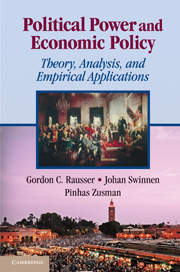Book contents
- Frontmatter
- Contents
- List of Figures
- List of Tables
- Preface
- PART 1 POLITICAL POWER AND ECONOMIC ANALYSIS
- 1 Public Policy: The Lens of Political Economy
- 2 The Nash Solution to the Bargaining Problem
- 3 The Harsanyi Solution to the Bargaining Problem
- 4 Political-Economic Analysis
- 5 Normative Political-Economic Analysis
- 6 Dynamic Political-Economic Analysis
- PART 2 IDEOLOGY, PRESCRIPTION, AND POLITICAL POWER COEFFICIENTS
- PART 3 ANALYSIS OF SPECIFIC STRUCTURES
- PART 4 EMPIRICAL APPLICATIONS OF POLITICAL POWER ESTIMATION
- References
- Index
2 - The Nash Solution to the Bargaining Problem
Published online by Cambridge University Press: 05 June 2012
- Frontmatter
- Contents
- List of Figures
- List of Tables
- Preface
- PART 1 POLITICAL POWER AND ECONOMIC ANALYSIS
- 1 Public Policy: The Lens of Political Economy
- 2 The Nash Solution to the Bargaining Problem
- 3 The Harsanyi Solution to the Bargaining Problem
- 4 Political-Economic Analysis
- 5 Normative Political-Economic Analysis
- 6 Dynamic Political-Economic Analysis
- PART 2 IDEOLOGY, PRESCRIPTION, AND POLITICAL POWER COEFFICIENTS
- PART 3 ANALYSIS OF SPECIFIC STRUCTURES
- PART 4 EMPIRICAL APPLICATIONS OF POLITICAL POWER ESTIMATION
- References
- Index
Summary
Introduction
Policy formation is a process of political interaction among individuals and groups. Because participants in the political process may not have identical interests, their divergent political preferences make conflicts unavoidable. However, such conflicts are often resolved in the policy formulation process, with the emerging policies reflecting both the participants' policy preferences and their political power. This is the essence of the political power theory of policy formation. Presuming that interactions emerge through bargaining and negotiations among participants, the following major questions arise: What aspect of political interaction gives rise to observed economic policy? How are the political conflicts resolved? How can this process be modeled?
Among the various approaches to the solution of this inherent bargaining problem, the Nash/Harsanyi (NH) conceptualization provides an internally consistent framework. Along with the strong theoretical foundations of the NH theory, it is also a convenient analytical model. The theoretical foundation for this framework is the basis of Harsanyi's (1962a, 1962b) model of social power. As this particular bargaining theory is widely employed in this book, the present chapter is dedicated to the introduction and exposition of the NH theory.
Nash's axiomatic solution to the two-person bargaining problem, given fixed disagreement payoffs, represents the core of the bargaining framework presented in this chapter. In Chapter 3,we will analyze the problem of mutually optimal threat strategies that the two parties may select in order to influence disagreement payoffs and, indirectly, the bargaining outcome.
- Type
- Chapter
- Information
- Political Power and Economic PolicyTheory, Analysis, and Empirical Applications, pp. 30 - 49Publisher: Cambridge University PressPrint publication year: 2011
- 1
- Cited by



